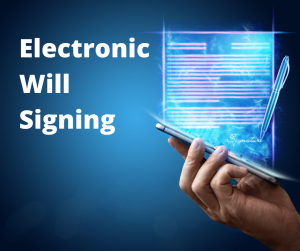Prior to the COVID-19 pandemic, wills needed to be signed in person and witnesses (including notaries) needed to be on hand to see the will creator’s actually sign the will.
When the pandemic got underway, Illinois Governor Pritzker signed an Emergency Order declaring that for health and safety related reasons, wills could be signed electronically and that notaries public and other witnesses could view the signing from afar, provided they had a dependable audio and video connection.
In July, 2021 Illinois passed the Electronic Wills and Remote Witnesses Act codifying that Executive Order and made it a permanent feature of trusts, wills and estate planning going forward in the state of Illinois. Advocates say it’s safer, more efficient and, if anything, less likely to lead to fraud since the session is recorded and documents are transmitted securely and kept in protected electronic vaults.
The legislation states that electronic wills must be documented in such a way that any tampering can be detected, they must be executed by either the person leaving the will or someone they direct to do so—which can’t be a named beneficiary or their next of kin—and that two or more credible witnesses must first see the person sign the will and then attest to that signature by signing it themselves. The will must be executed within the state of Illinois.
Remote witnesses can attest to a will that’s either on paper, electronic, or a paper copy of an electronic document. A witness must be able to identify the person creating the will either by attesting that they know the person, by using a picture ID that’s government-issued or otherwise official, or through identity proofing.
The new legislation also covers how probate works when it comes to electronic or remotely witnessed wills. Probate petitions must show how the record has been made tamper-evident and also demonstrate that it hasn’t been changed aside from electronic signatures and any other agreed-upon alterations.
Remote witnesses must testify that they have indeed participated, either by physically testifying in court or sending in either an affidavit or what’s called an attestation clause. Anyone involved in obtaining one of the latter documents—if it’s someone other than the will creator—must confirm that they have done so either orally in court or in writing.
If your head is spinning a bit, that’s understandable. It’s probably best to retain a knowledgeable attorney who can steadily walk you through these steps and requirements in detail. This ensures that your electronically created and/or remotely witnessed will sails through probate without catching a virtual virus—or getting snagged in the system because it doesn’t conform to requirements. The experienced estate planning lawyers of Bellas & Wachowski are available to assist in preparation of the most appropriate estate planning device for your personal and family needs. See our web site for more information about electronic will signing or contact Attorney Misty Cygan for more information.
 Chicago Business Attorney Blog
Chicago Business Attorney Blog


